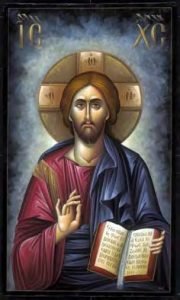 I have decided that I would, in this article about understanding the New Testament (NT), temporarily retreat from the more formal and technical explanation of our sacred writings that I have been doing and offer a more global understanding of them. We call these writings the “Word of God”. The Word of God expressed in the form of Holy Scripture and traditional creedal formulas possess an inherent power by which it communicates divine grace and truth. I would now like to emphasize the importance of this power of the Word as the means by which saving events of the past become actualized in the present moment within the life and experience of the Church. I do this mainly because in the article on the Divine Liturgy I have stressed the active remembering in which we should engage ourselves in order to make our worship real. For this actualizing power to become operative, however, it must be perceived and comprehended on the level of both mind and heart. Like sacramental grace, the operation of the divine Word depends upon a “synergism” or “co-operation” between divine initiative and human receptivity. This act of receptivity is essentially one of perception, know in patristic tradition as THEORIA, something that I briefly mentioned before, if you will recall. Theoria is a spiritual vision or contemplation of the divine presence and the divine economy, revealed within the framework of salvation history.
I have decided that I would, in this article about understanding the New Testament (NT), temporarily retreat from the more formal and technical explanation of our sacred writings that I have been doing and offer a more global understanding of them. We call these writings the “Word of God”. The Word of God expressed in the form of Holy Scripture and traditional creedal formulas possess an inherent power by which it communicates divine grace and truth. I would now like to emphasize the importance of this power of the Word as the means by which saving events of the past become actualized in the present moment within the life and experience of the Church. I do this mainly because in the article on the Divine Liturgy I have stressed the active remembering in which we should engage ourselves in order to make our worship real. For this actualizing power to become operative, however, it must be perceived and comprehended on the level of both mind and heart. Like sacramental grace, the operation of the divine Word depends upon a “synergism” or “co-operation” between divine initiative and human receptivity. This act of receptivity is essentially one of perception, know in patristic tradition as THEORIA, something that I briefly mentioned before, if you will recall. Theoria is a spiritual vision or contemplation of the divine presence and the divine economy, revealed within the framework of salvation history.
From the perspective of the Eastern Church, the interpretation of the Word of God is grounded in this “theoretic perception” of the saving power of the Word. One of the most pressing needs within the Church today is to recover the patristic vision of the dynamic quality of the Word as the instrument of God’s self-disclosure and self-communication.
The relationship between Word and Sacrament in Eastern Christianity, is one of essential unity, grounded in silence. “In the beginning God speaks out of silence to create heaven and earth by the power of His Word. Divine speech has a dynamic, creative quality that may be termed “sacramental,” in that it accomplishes what it signifies. Through His “word-reality”, Yahweh determines the growth and destiny of His chosen people while uniting Himself to them in a covenant of love.
We must see that God has, from the beginning of creation, spoken His Word to gradually bring humankind to a deeper understanding of His intent when He created all things.
